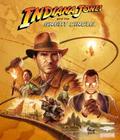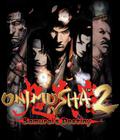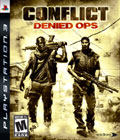Genre: First-Person Shooter
Publisher: Eidos
Developer: Pivotal Games
Release Date: February 12, 2008
More FPS titles with squad and co-op features have been showing up on shelves lately, and these novel options have evolved into expected fare among action fans looking to share their adrenaline fix with a friend or as part of a team. Titles such as Crackdown, Gears of War and Rainbow Six: Vegas have made buddy games fun and exciting distractions for Xbox 360 owners, raising the benchmark about what to expect in the next wave. With upcoming offerings such as EA's Army of Two, Epic's Gears of War II and Zombie Studios' Rogue Warrior, Eidos is throwing its camouflaged hat into the ring with the latest addition to the Conflict series, Conflict: Denied Ops.
The Tom Clancy-ish premise for Denied Ops puts the player in the role of two men who are members of the CIA's Special Activities Division (SAD), an ultra-secret black ops outfit specializing in taking on the kind of missions that no one knows anything about. Smack-talkin' former FBI agent Lang and ex-Delta Force member Graves must head into hot spots around the world to prevent a rogue Venezuelan general from playing his nuclear wild card. The concept is exciting stuff, and while it's similar to what players may have experienced in Black, Ghost Recon and Splinter Cell, the gameplay feels outright dated in comparison to its peers.
Despite the flashy menu and covert-ops feel of the presentation, the graphics appear as if they were pulled from the original Xbox and then polished up for the 360. Many areas appear exposed and flat, turning what should be a detailed building façade into a less-than-impressive collection of polygons; flickering shadows — or the lack thereof — and the occasional texture seam also contribute to the title's unpolished feel. There are occasions when the level design and overall aesthetics deliver the goods, such as in a Siberian castle crawling with goons, or the dark corridors of a rogue freighter on its way to the U.S. The cartoony in-game cinemas, complete with caricatured animation and flat dialogue, would have been more at home in a game that didn't take itself quite so seriously.
The engine that runs Denied Ops is not without its problems, either. In one area, there were missing textures that came up as multicolored squares, and at another point, my AI-driven partner was shooting at something in the sky. When I turned to look at what I expected to be a catwalk or skylight where a sniper might be hiding, a body dropped from the clouds. There's not much to look forward to with the sound; weapon effects don't look as good as you would hope because of the flat lighting, guns sound tinny and weak, and the music never gets you in the mood to believe in your crucial mission.
Wooden barricades and other destructible objects, such as crates that infest every mission from Siberia to Venezuela, can be taken apart by your bullets and grenades. Further feeding the soldierly need to break things, explosive barrels, fuel tanks and bottles are conveniently placed in every conceivable location, just waiting for bullets to turn them into fireballs. Even a few buildings can be knocked down after lobbing a shell from an APC that you'll be commandeering in one of the missions. As fun as it is to wreck enemy-held territory, you still can't shoot through everything, even if it looks as if you should. In other instances, you, your partner and your foes can destroy crates by simply coming into contact with them. This would have been funny and bizarre to watch in real life.
If you've gone to war in an FPS before, Conflict: Denied Ops will feel familiar in terms of the controls and gameplay. There are a few tweaks to help it stand apart a little from the competition. You'll be able to select from a set of missions early on, such as whether you want to start the fight in Africa or Siberia; a few of the levels reflect this in their designs by providing several ways to achieve get to your objectives. Denied Ops also allows the player to switch between Lang and Graves on the fly, which provides what should be an exciting change of pace over simply playing the game as one of the characters. Lang's CIA training gives him the edge in sneakiness, and he's always armed with a silenced pistol and a sniper rifle to help keep things quiet, while Graves' heavy-hitting personality equips him with the big guns.
They're not indestructible, either, and both men will need to survive if you want to get through each mission. Fortunately, agents simply get "stunned" when they go down, and you have a few minutes to get over and heal them before they go to the great respawn point in the sky. Unfortunately, the gameplay doesn't make much use of Lang's ability to sneak around; it involves a bit of guesswork to figure out who can see you and who can't, and most firefights turn into public spectacles without much of a consequence for being noisy. The first few missions require you to use each character for certain roles, such as downloading info from a laptop or disarming a bomb, but oddly enough, this becomes far less frequent in later stages. Instead of making the most of this partnership, it can often feel as if you're playing the game with a soldier who was split into two personalities simply to make this feel like a buddy game.
You can order your partner to stay where he is, and he will faithfully do what you ask until you call him back. This also has its share of problems; simply aiming at a spot and clicking on the order button sends him into cover or to whatever position you want, but the results are inconsistent. You will often find yourself wondering why he hasn't moved yet. While it can be easy to simply switch over to your partner and do it yourself, asking him to come to you should work as intended … if the pathfinding were a bit more polished. If you happen to have gone far ahead of your partner, he tends to find the longest way back to you and may run into a few enemies just for good measure. Even when I was just in the next room, I saw instances where my partner would go back the way he came and take another passage to get to me, running into enemy patrols, complaining about enemy fire, and then getting "stunned." This happened more often than I would have liked, and after I got tired of it, I started taking control of both characters just to keep them out of trouble.
In Denied Ops, you'll be facing a typical FPS clone army, but thanks to the sheer number of soldiers that it throws at you (and their generic dialogue), much of the excitement becomes a monotonous shooting gallery. Headshots count, but if you shoot an enemy soldier anywhere else, it can take three or four hits to finally take them down. Even with Graves' sniper rifle, hitting someone in the hip, groin or arm won't necessarily keep him down. Likewise, if you decide to open up with Lang's light machine gun, don't be surprised if you burn through half of your ammunition at less than 10 yards as the enemy goes through the motions of possibly dying. These aren't super soldiers, and they don't wear Kevlar everywhere, but thanks to some hidden science, they can take a tremendous amount of damage that makes you feel as if you were packing spitballs.
Enemies are also trapped in saying the same lines ad nauseam in accented English, no matter where in the world you are. The banter between Lang and Graves unconvincingly attempts to build on a buddy cliché as they ponder weighty questions such as the name of Graves' gun, or listening to Lang end nearly every sentence with "bro." While the inane dialogue may be a good match for the cartoony cinemas, it's incongruous with the black-ops feel of Denied Ops.
Aside from being able to soak up the kind of damage that made Rambo a household name, the enemy will also show some signs of intelligence by taking cover, blindly firing when they're pressured, and staying mobile in order to remain difficult targets. Your AI partner will do the same thing by taking cover behind obstacles, watching your back or holding his ground if ordered to do so ... most of the time. Other times, he'll run blindly ahead to find cover despite the hail of gunfire coming from that direction, or he may decide to run in front of your line of fire, which you won't realize until you discover that you've taken down your own partner.
Progress is saved via checkpoints, but the spacing between each one can force you to repeatedly fight through large sections if both men die. After each completed mission, both Lang and Graves will earn weapons upgrades, such as a shotgun attachment to a sniper rifle or a missile launcher. Bullets are infinite, likely due to the spotty hit detection and hyperstamina with which the enemy is fortified, and weapon caches on the field refill whatever explosives you may have used. Despite the weapons dropped by your foes, you'll never need to pick up anything on the battlefield, thus making the action even less exciting than it already is.
Players can also play through the entire campaign or specific missions in co-op mode, if they can find someone else to play with. The lobby was empty most of the time, and when I did find someone, connection issues would keep one of us from even getting into the game. Multiplayer wasn't any better, with only three basic game types and a handful of maps, but the lobby was just as empty there as it was with co-op. There are leaderboards so you can compare your mission completion times against others, as well as multiplayer scores and ranked matches, where you can vie to be the top agent. Unless you have to own every multiplayer game out there, though, or want to play Denied Ops via system link with a friend, there's not a lot more to look forward to here.
It's honestly difficult to recommend Conflict: Denied Ops to anyone, when shelves are stocked with better titles that pack a decent amount of military action and co-op enjoyment. With a tedious single-player campaign riddled with monotonous action and online play offering a bare-bones experience, the best that players can hope for with Denied Ops may be to simply deny having played it.
Score: 5.3/10
More articles about Conflict: Denied Ops











 Conflict: Denied Ops, previously called Crossfire, is a new paramilitary themed co-op FPS putting you in control of two of these merciless operatives, each of them highly specialized in both weapons and military tactics.
Conflict: Denied Ops, previously called Crossfire, is a new paramilitary themed co-op FPS putting you in control of two of these merciless operatives, each of them highly specialized in both weapons and military tactics.














































